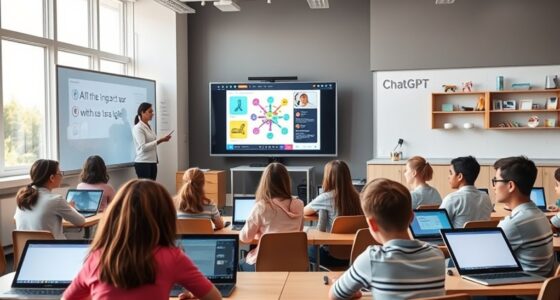To plan the perfect educational trip, start by choosing destinations that spark curiosity, like Rome for its history or Japan for its culture. Set clear educational goals to guide your itinerary. Mix structured activities like museum visits with free time for exploration. Keep a close eye on your budget, breaking it down into daily spending limits. When booking, opt for places that enhance the learning experience, like local workshops. Don't forget to visit cultural sites and encourage journaling to reflect on what you learn. There's even more helpful advice ahead, so keep going! Consider incorporating hands-on experiences to further engage students, such as cooking classes or nature hikes. Additionally, look for opportunities to connect with local schools or organizations for a cultural exchange. And while it’s important to focus on educational activities, remember to also allow for some relaxation and fun. You could even consider incorporating some downtime for students to enjoy a world of solitaire game in the evenings as a way to unwind after a day of learning and exploration.
Key Takeaways
- Research unique cultural destinations and seasonal events to create an engaging educational experience for all ages.
- Develop a structured itinerary that balances organized activities with free time for exploration and spontaneous learning.
- Set a comprehensive budget covering all trip expenses and monitor daily spending limits for flexibility.
- Book travel essentials directly with airlines and explore various accommodation options for the best fit.
- Incorporate local workshops and cultural experiences to enhance learning and foster curiosity about diverse traditions.
Destination Inspiration and Selection
When it comes to planning an educational trip, finding the right destination can set the tone for an enriching experience. Start by exploring resources like "The Travel Book" by Lonely Planet or social media platforms such as Pinterest and Instagram. These tools can help you discover destinations that align with your personal interests and learning objectives.
You might consider destinations with unique cultural expressions, such as those featuring Aboriginal art concepts, which can add depth to your understanding of indigenous cultures.
Consider places known for their rich cultural heritage, like Rome or Kyoto. These cities offer immersive educational opportunities that can deepen your understanding of history and arts.
Additionally, research seasonal events, such as the tulip festival in Holland or Japan's cherry blossom festival. These events enhance your trip's educational value by providing unique cultural experiences.
While trip planning, utilize tools like Kayak's Explore to find cost-effective travel options to destinations with renowned museums, historical landmarks, and natural wonders that facilitate learning.
It's also a great idea to create a bucket list of potential educational destinations. Involve feedback from family members to guarantee everyone finds engaging learning opportunities that cater to all ages.
With thoughtful selection, your destination can transform your traveling experience into an unforgettable educational adventure.
Crafting an Engaging Itinerary

Crafting an engaging itinerary is essential for making the most of your educational trip. Start by identifying your key educational goals, which will guide your planning and guarantee a focused experience.
Consider incorporating elements of the tiny house movement into your itinerary, as exploring minimalist living can provide valuable lessons in sustainability and resourcefulness.
Here are four tips for creating an effective itinerary:
- Mix Structured and Unstructured Activities: Include guided tours or museum visits alongside free time for spontaneous exploration. This flexible itinerary allows for both learning and relaxation.
- Incorporate Local Events: Check for festivals or events during your travel dates. These experiences can provide unique insights into the culture and enhance your educational goals.
- Utilize Travel Apps: Use apps to plan efficient routes between activities. This minimizes travel time and maximizes your learning opportunities at each stop.
- Schedule Reflection Time: At the end of each day, allocate time for discussion and reflection. This will help reinforce what you've learned and make the trip more impactful.
Budgeting for Your Educational Trip

Budgeting for your educational trip is essential to guarantee you make the most of your experience without financial stress. Start by establishing a total budget that includes costs for transportation, accommodations, meals, and activities.
Research the average cost of living in your destination to align your budget with local prices, ensuring you have enough for essential expenses and enriching experiences. Additionally, consider exploring resources on caregiver support that can enhance your trip's educational value.
Break down your budget into daily spending limits to manage your expenses effectively, allowing flexibility for unexpected costs or spontaneous opportunities. This approach helps you stay on track and avoid overspending.
Consider using travel rewards credit cards to maximize your savings. These cards often offer bonus miles and various travel perks that can help offset your trip costs.
Additionally, setting aside a separate bank account dedicated to travel savings makes it easier to track your progress toward your budget goals, preventing you from dipping into your everyday finances.
Booking Essentials for Travel

Booking essentials for travel can greatly enhance your overall experience and help you avoid common pitfalls. To make your trip smooth and enjoyable, follow these key steps:
1. Book flights: Prioritize booking directly with airlines after using comparison platforms like Kayak or Google Flights. This not only saves you time but also guarantees better customer support for any issues that arise.
Additionally, consider reviewing key factors in choosing a service that align with your travel needs.
2. Research accommodation: Explore various options, considering platforms like Airbnb for unique stays or Booking.com for hotels.
Compare prices diligently to find the best deals that fit your budget.
3. Check visa requirements: Be proactive in understanding visa requirements for your destination.
Some countries may need you to obtain a visa before arrival, while others offer visa-on-arrival options.
4. Organize travel documents: Confirm all travel documents, including passports and vaccination records, are easily accessible.
This preparation helps you avoid disruptions during your trip.
Lastly, don't forget to purchase travel insurance.
This covers unexpected emergencies like medical issues, trip cancellations, or lost belongings, providing you peace of mind while traveling.
Enhancing Learning During Travel

Traveling isn't just about seeing new places; it's a fantastic opportunity to enhance learning in a way that textbooks alone can't provide. By visiting cultural sites, museums, and historical landmarks, you can deepen your understanding of geography and history. These educational experiences create lasting memories that enrich your child's knowledge.
Engaging in family activities that promote creativity, such as local art workshops, can further enhance the travel experience and inspire innovation in your children's thinking family activities that promote creativity.
Engaging in hands-on activities, like local workshops or ecological tours, reinforces concepts learned in the classroom. These practical applications not only enhance learning but also improve retention.
Before you travel, research local customs and traditions with your kids. This empowers them to immerse themselves in the culture, sparking curiosity and respect for diversity.
Encourage your children to keep a travel journal. Documenting their experiences allows them to reflect on what they've learned, enhancing their writing and creativity skills.
Engage in discussions about their daily encounters and the new knowledge they gain. This dialogue fosters critical thinking and helps solidify their understanding of the world.
Frequently Asked Questions
How to Plan the Perfect Travel Itinerary?
To plan the perfect travel itinerary, assess your trip length and available time. Create a flexible daily schedule, factor in transportation, include educational stops, and research local customs to enrich your overall experience.
How to Plan a Perfect Trip?
To plan a perfect trip, you should first challenge the idea that spontaneity is key. Establish a budget, research your destination, and create a flexible itinerary that balances activities with downtime for a fulfilling experience.
How to Make a Trip Educational?
To make your trip educational, research destinations for historical landmarks and museums. Engage in hands-on activities, utilize local resources for programs, encourage daily reflections, and leverage educational apps to deepen your understanding of the culture.
How to Plan a Travel Itinerary Like a Pro?
Planning a travel itinerary's like crafting a symphony; you need harmony between structure and spontaneity. Assess your time, research attractions, create a flexible schedule, and utilize apps for seamless navigation and unforgettable experiences.
Conclusion
As you commence your educational adventure, remember that like Odysseus, the journey is as essential as the destination. By carefully selecting your destination, crafting an engaging itinerary, and budgeting wisely, you'll not only enrich your knowledge but also create lasting memories. Embrace the unexpected lessons along the way, and let each experience illuminate your path. With thoughtful planning, you're sure to transform an ordinary trip into an extraordinary quest for knowledge and discovery.










